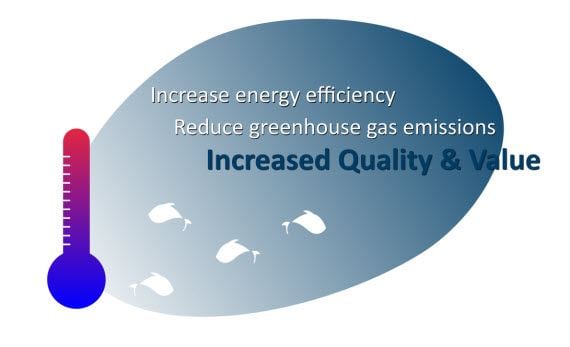Final popular science presentation
The final report can be read here
The national and international fishing industry faces major challenges in reducing climate gas emissions. To cope with this, new fuels and engine technologies for propulsion of fishing vessels are under rapid development. But it is not only the fuel consumption related to propulsion that contributes to the emissions of climate gases. On board there are also energy consuming equipment to keep the catch refrigerated, ensuring product quality and shelf life. There are also systems for producing the hot water on board.
The ambition of the project was to contribute to developing energy-efficient and climate friendly systems for cold and heat production onboard fishing vessels. A refrigeration plant contributes to global warming in two different ways: consumption of energy (electricity) to drive the plant and leakage of the refrigerants. Several refrigerants have a significant global warming impact. Norway is at the forefront of replacing these refrigerants with natural refrigerants, which have no negative environmental impact. Further development of these systems has been an important part of the project, as well as global transferring of knowledge and technology. The results have been disseminated internationally through participation in conferences, collaboration with other projects and open access to the publications.
An additional way to reduce climate impact is to reduce the energy consumption for the production of cold and heat by integrating these systems. Concepts for such integrated solutions have already been developed for supermarkets. In this project, we have investigated the performance of a transcritical CO2 heat pump chiller (two-stage evaporator: gravity fed/ejector fed), both in the laboratory and with modelling. It is too early to use it on board fishing vessels, but the results show that this combination can result in compact and energy-efficient systems. Another concept that has been evaluated in the project is the utilization of cold from LNG-driven ships. We have seen that there is a potential for this, for example for chilling of the fish on the way back to land, but there could be challenges in how to design these systems. We have also investigated possibilities of improving processes and technology for handling the rest raw materials and hydrolysates. These processes require as much energy as steam/heat, so we analyzed alternative methods with freeze concentration. This is gentler on the products, but the technology must be developed to be more robust before it is included onboard.
The project, which is led by SINTEF Ocean and includes SINTEF Energy and NTNU as research partners, was carried out in close cooperation with industrial partners and the international scientific community. We have had nine workshops in the project, where the first was with Norwegian industry in 2019 and the following three (2020 and 2021) were conducted as Teams meeting, including international participants. We had a project meeting in November 2021 where all industry partners were invited. In November 2021, we had a workshop on thermal energy storage, which was a collaboration between 4 SINTEF/NTNU projects. A similar workshop was held at the end of 2022. We had a workshop in Ålesund in September 2022, summarising most of the project's activities. Many industry partners participated there. Another workshop was organized during the International Congress of Refrigeration (Paris, August 2023) on the topic “Training on clean cooling and heating solutions”. We have had many other meetings in the project, especially within the industry cases.
Seven reports have been published during the project, for example: "Alternative Fuels and Propulsion Systems for Fishing vessels", "Carbon Footprint of Fisheries - a review of standards methods and tools" and "Equipment and systems onboard fishing vessels". We have published 18 journal and conference papers, for example International Journal of Refrigeration, IIR conference on sustainability and the cold chain, IIR Gustav Lorentzen Conference on natural refrigerants, and IIR Conference on Ammonia and CO2 Refrigeration Technologies.
We have had eight master's students that delivered from 2020 to 2023. They have presented their work to the project group, but also at conferences, for example the Norwegian refrigeration society’s annual meeting. Some of the Master students are now employed by CoolFish partners. We have also been on a research cruise, where we gathered data from a fishing vessel, which are shared via scientific publications.
About the CoolFish project
CoolFish will develop technologies and concepts for more integrated, energy-efficient and climate friendly cooling, freezing and heating onboard fishing vessels. It will also increase the knowledge transfer between research and industry, both nationally and internationally.
Background
The national and international fishing industry faces major challenges to be able to contribute in reducing greenhouse gas emissions. To cope with this, new fuels and engine technologies for propulsion of fishing vessels are under rapid development. On board there are also energy-consuming equipment to keep the catch refrigerated and systems for producing hot water. The development of new propulsion technology alters the premises for thermal energy demand and production, thereby directly influencing the design of the next generation of onboard refrigeration systems. This project aims to contribute in the development of these next generation refrigeration systems and doing so in an energy efficient and climate friendly fashion by utilizing the opportunities provided by new propulsion technology and employing natural refrigerants.
Global warming
There are two ways a refrigeration plant can contribute to global warming:
- Primary energy use (electricity)
- Leakage of refrigerants with high GWP (global warming potential)
The onboard electricity is often generated by fossil-fuelled generators, implying that a reduction in a refrigeration plants energy usage is not only wise in economic terms, but also lowers the carbon footprint. Another source which contributes to global warming is refrigerant leakage, which due to the rough conditions at sea tends to be relatively higher than for a land-based plant. A transition from synthetic refrigerants with high GWP-values towards natural refrigerants which have no negative environmental impact is therefore essential. In addition, experience from the ongoing innovation of refrigeration systems employing natural refrigerants indicates that these are a good match for chilling and freezing of fish in terms of quality!
New technology alters the premises
New propulsion technology and new fuels alters the premises for thermal energy production and demand onboard fishing vessels. For instance, an electricity driven vessel doesn’t provide the same heat recovery possibility as for fossil-fuelled vessels, meaning that next-gen energy system must cover a larger share of hot thermal demands. Former research has generated a broad knowledge and expertise in this kind of issue and has ultimately led to a successful introduction of integrated cooling-and-heating systems using CO2 as refrigerant for the Nordic supermarket sector. Applying and further expanding upon this knowledge is within the scope of CoolFish, by adapting the technology to the operational conditions of fishing vessels.

LNG is emerging as fuel of choice for more and more vessels. This introduces the possibility to cover a significant portion of the cooling and freezing demand for fish preservation by utilizing the surplus cold from the LNG system. Thermal energy storage is another interesting feature, offsetting the mismatch between energy production and demand, which might be a good fit for systems onboard fishing vessels. All these possibilities will be investigated within the CoolFish project.
Partners
The project is being led by SINTEF Ocean with research partners SINTEF Energy Research and NTNU, and with industry partners MMC First Process, Bluewild, Selvåg Senior/Sørheim Holding, GASNOR, Danfoss, Perfect Temperature Group and Isotherm Inc. The reference group consists of International Institute of Refrigeration, London South Bank University and Johnson Controls.



